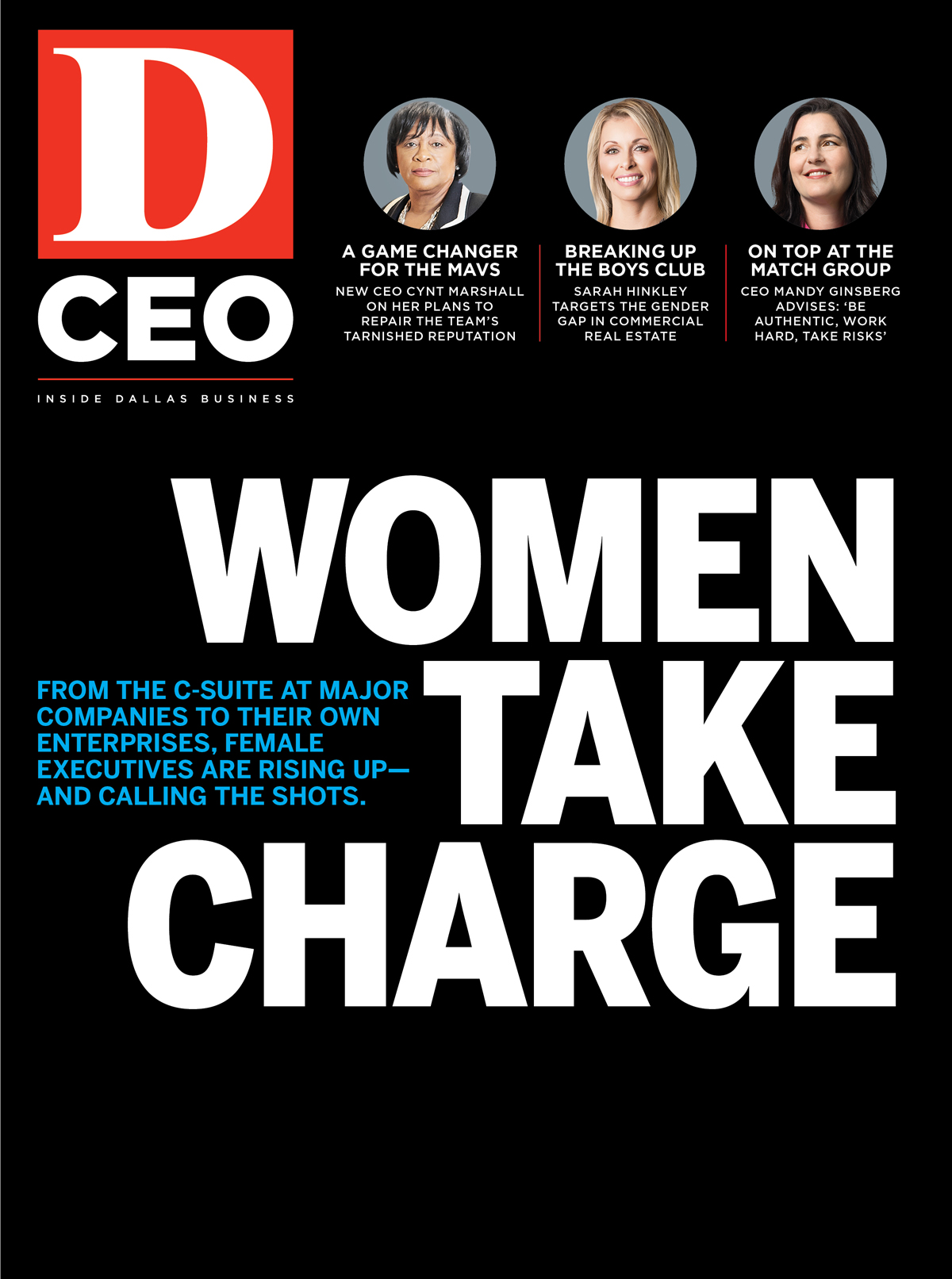Why you need to know her: Because, for almost two decades, Mark Cuban didn’t, and the culture of the Dallas Mavericks’ business operations festered until the #MeToo reckoning made its victims comfortable enough to tell their stories. What they alleged was horrifying: the team’s former CEO, Terdema Ussery, made lewd sexual comments, touched employees, and had been investigated by the team without action 20 years before Sports Illustrated published its report. He had protection from his chief of human resources, Buddy Pittman, who allegedly bullied his boss’ accusers into keeping quiet. Too, the team’s in-house beat writer, Earl K. Sneed, had kept his gig even after pleading guilty to a domestic violence charge. He later was accused of assaulting another girlfriend, a coworker he met on the job.
Cynthia “Cynt” Marshall didn’t know any of this when Mark Cuban called and asked to meet; she read the reports in the car on the way over. She admits now that she didn’t know who Cuban was. She’d had a brilliant 36-year career with AT&T, bookended as its beloved chief of human resources before her retirement in 2017. She didn’t have much time for television.
After retiring, she landed a contract consulting gig that was wrapping up. She’d been able to spend more time with her husband and their four children. As NBA Commissioner Adam Silver later told her, she didn’t have to do this. But the stories of #MeToo emerging nationally—women passed over in the workplace, women harassed, women raped—had a profound effect she didn’t fully process until walking out of Cuban’s office.
“As I’m leaving, two women stopped me and said separately, ‘Are you the person Mark says is … going to help us?’ They said, ‘We just need some help,’” she says. “I realized, I truly get to be a part of the solution.”
Marshall was a victim of domestic violence herself. Growing up in a housing project in the Bay Area, she watched her father shoot a man in the head who had a gun aimed at her. Her father turned abusive and later left the family. Marshall credits her mentors at AT&T for her professional growth; they encouraged her to speak up in meetings and listened to what she had to say. Women in the Mavericks organization didn’t always have that kind of support. To Marshall, her new job is personal.
It also won’t be easy. The day before I met Marshall in her office in the new Mavericks headquarters, one of the victims, Melissa Weishaupt, put her name on the allegations. Ussery had hid behind the anonymity of the victims in the SI report: “I am deeply disappointed that anonymous sources have made such outright false and inflammatory accusations against me,” he wrote in a statement.
Weishaupt responded: “I am using my name because I am still not sure the Mavericks get it. I am using my name because I am convinced Cuban still doesn’t recognize the culture he’s helped create or the plight of the women who still work for him.”
Marshall does not run from these feelings. When reporters call, she addresses their questions and then invites them to come spend time in the office.
“I can’t call them allegations. I don’t want to do that because I don’t want it to appear I’m trying to discount the women,” she says. “I have no reason not to believe that what they said happened, happened. Our job now is to make sure that as much of it comes out as possible, and then we address.”
“I can’t call them allegations,” Marshall says. “I don’t want it to appear I’m trying to discount the women.”
To do so, she hired two high-ranking HR staffers who previously worked at AT&T to overhaul operations in the Mavs’ C-suite: Tarsha LaCour, vice president of HR, and Cyndee Wales, chief ethics and compliance officer. Just like that, three of the senior leadership at the Mavs were women—a first. LaCour and Wales rewrote the company handbook. LaCour scheduled a half-day seminar on harassment and bullying for April. (The players will attend one in September. Cuban’s was in May.) Wales has established a private hotline for employees. She’s interviewing former employees and creating timelines using personnel files.
They want to be prepared for the findings of Evan Krutoy, a 20-year New York prosecutor, and Anne Milgram, New Jersey’s ex-attorney general, who are currently poring through tens of thousands of electronic files to determine just how systemic the problem was. Marshall expects that report in July and promises swift justice that will be as public as it can legally be. Meanwhile, she’s continuing her 100-day plan: She’s already rearranged the marketing department and is about halfway through one-on-one meetings with the team’s 140 employees.
So, what now?
If you believe Cuban, he didn’t know what was going on in the former Deep Ellum headquarters. (Marshall’s take: “There’s only one person in my mind that knows what Mark knew. That’s the Lord.”)
“The only way I was going to learn the problems we had to address were if people spoke up,” Cuban says. “Because obviously they don’t want to tell me.”
Over the weeks since we spoke, more stories of that corrosive office culture have become public. In March, Deadspin reported about a sales staffer who would watch pornography on his computer in the middle of the open floor plan nearly every day. The report included tales of screaming and bullying, as well as a rumor that a used condom had been dropped on the floor.
In June, The Dallas Morning News identified the salesman as Chris Hyde, a 15-year veteran of the Mavs’ sales team who was fired in 2014. According to The News, employees called him the “Pants DJ” behind his back, a reference to how he would rub himself while watching the erotic videos in the office. The report also alleged that Cuban had told him to stop watching the porn; Cuban has not responded to the specific claim, instead referencing the ongoing investigation and passing questions to his new CEO. Yet another incident was unveiled on Friday by Deadspin. George Prokos, the head of the Mavericks’ ticket sales department (which had been beset by reports of yelling and bullying, and had allowed Hyde to maintain his employment), was no longer in that role.
Marshall maintains that all this is in the past. She’s here to change the company’s culture, to make the employees comfortable enough to tell her what’s going on and what happened. And when I leave her office, her door remains open.
A version of this story appears in the June issue of D CEO.
Get the D Brief Newsletter
Author







